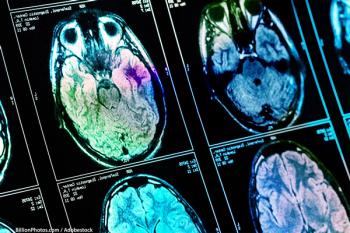
- ONCOLOGY Vol 21 No 10
- Volume 21
- Issue 10
Investigational Drug Cediranib Shows Promise in Patients With Recurrent Glioblastoma
Data for the investigational agent cediranib (AZD2171) were presented at the annual meeting of the American Society of Clinical Oncology (ASCO) from a phase II monotherapy study in patients with recurrent glioblastoma, the most aggressive form of primary brain tumor, with a high unmet medical need.
Data for the investigational agent cediranib (AZD2171) were presented at the annual meeting of the American Society of Clinical Oncology (ASCO) from a phase II monotherapy study in patients with recurrent glioblastoma, the most aggressive form of primary brain tumor, with a high unmet medical need.
Results from the National Cancer Institute (NCI)-sponsored study at the Massachusetts General Hospital Cancer Center showed that 8 (27.6%) of the 31 patients with recurrent glioblastoma treated with cediranib, were alive and progression-free at 6 months. The dose-limiting toxicities most commonly observed in this study included hypertension, fatigue, and diarrhea.
Cediranib is a selective vascular endothelial growth factor (VEGF)-signaling inhibitor that targets all three VEGF receptors. The drug is currently in phase II/III development for advanced non-small-cell lung cancer (NSCLC) and advanced colorectal cancer as well as being investigated as part of a wide-ranging signal search program in other tumors such as glioblastoma.
"These encouraging data showing effects on progression-free survival warrant further investigation," commented Dr. Tracy Batchelor, chief of Neuro-Oncology at the Massachusetts General Hospital Cancer Center, associate professor of neurology at Harvard Medical School, and lead author of the phase II study.
Added Benefit
"In addition, cediranib alleviated brain swelling (edema) in many patients. Edema is a debilitating symptom in many brain cancer patients and is currently treated with steroids, which can carry their own debilitating side effects. Based on the first 16 patients, a steroid-sparing effect was demonstrated in most patients and was associated with the normalization of tumor vessels. This normalization might help to secure delivery and improve effectiveness of other therapeutic techniques such as chemotherapy drugs and radiation therapy," Dr. Batchelor said.
"The prognosis for recurrent glioblastoma patients is poor," commented AstraZeneca's Dr. Nick Botwood, global medical director for cediranib. "These are promising phase II results, and discussions are ongoing with Dr. Tracy Batchelor and his group regarding a confirmatory study in recurrent glioblastoma."
Phase II Study in Metastatic Renal Cell Carcinoma
Another ongoing NCI-sponsored cediranib phase II study, presented at ASCO 2007 by investigators from the Princess Margaret Hospital in Toronto, Canada, looked at cediranib in first-line, progressive, unresectable, advanced metastatic renal cell carcinoma.
A total of 27 patients receiving cediranib as monotherapy were able to be evaluated for response with a response rate of 33% (9 out of 27 patients) and tumor control rates of 66.7% (18 out of 27 patients). The most common toxicities were fatigue, hypertension, diarrhea, and voice alteration.
"Renal cell carcinoma is a chemoresistant disease that has traditionally been difficult to treat, resulting in poor prognosis for patients; hence, these early data are encouraging," commented Professor S. Sridhar of the Princess Margaret Hospital Phase II Consortium, Toronto.
These results support another cediranib publication of renal cell carcinoma patients presented at ASCO 2007. In addition, an ongoing AstraZeneca-sponsored phase II, randomized study is currently investigating the efficacy of cediranib in patients with metastatic or recurrent RCC who have had no previous anti-VEGF therapy.
Articles in this issue
over 18 years ago
The Top of My Christmas Listover 18 years ago
Further Considerations About NHL in the Elderlyover 18 years ago
Controlling Cancer Pain: Much Progress, Barriers Remainover 18 years ago
Tailoring Treatment in Elderly Patientsover 18 years ago
New Drugs Bring New Questionsover 18 years ago
Opioids in Cancer Pain: A Few Clarifying ThoughtsNewsletter
Stay up to date on recent advances in the multidisciplinary approach to cancer.






































